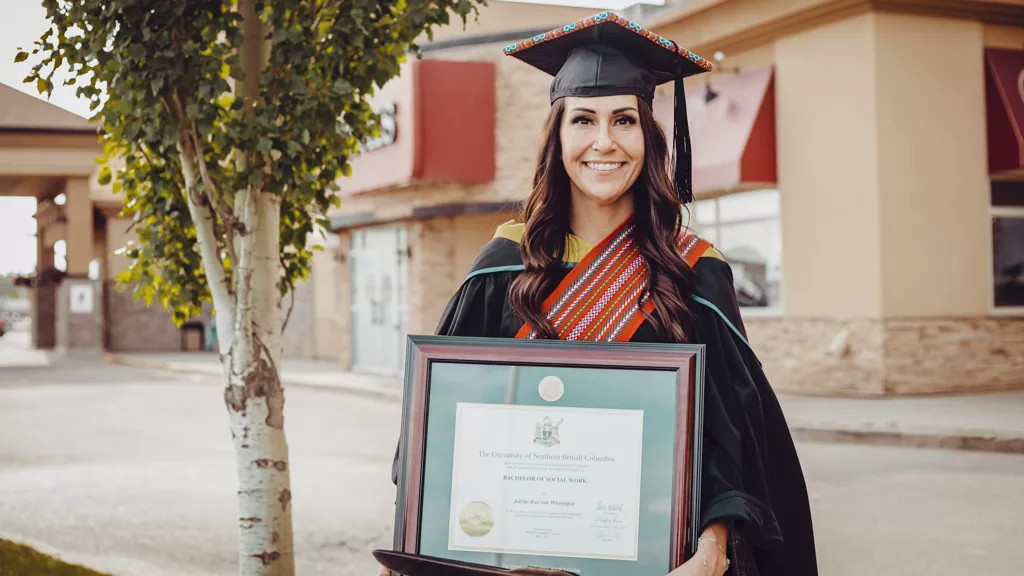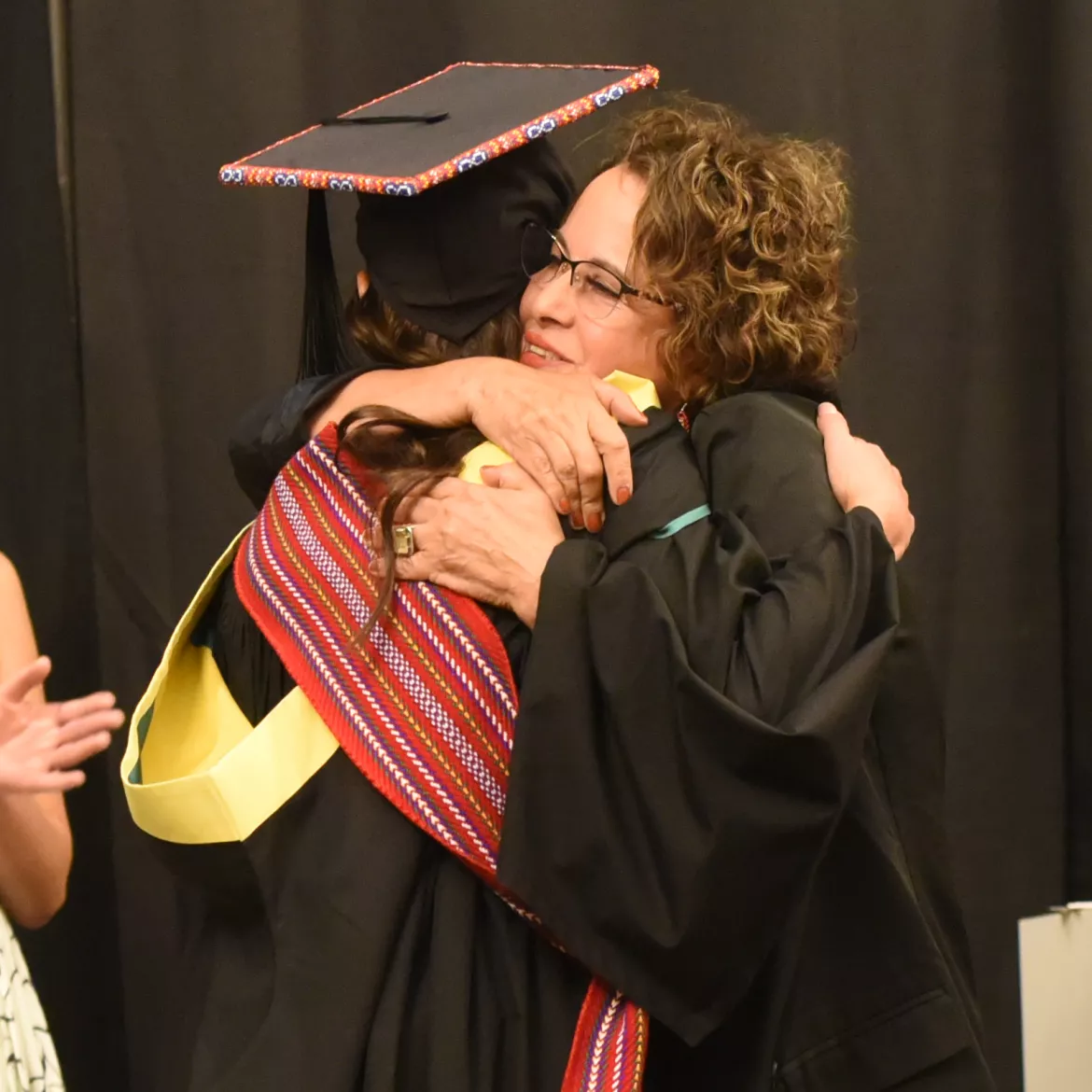Cultural ties inspire career path
A move to Fort St. John to reconnect with extended family has led to a much deeper connection to her cultural roots for Jolene van Wieringen. The recent UNBC graduate found her community and calling during a practicum placement while completing her Bachelor of Social Work degree at the Peace River-Liard campus.

When Jolene van Wieringen was gifted her Métis sash, it was carefully placed over her shoulder to avoid her graduation cap and tied atop her black robe to the warm applause of those attendance.
Van Wieringen had just walked across the stage in front of family, friends and community supporters gathered at UNBC’s graduation ceremonies in Fort St. John. She was one of seven graduates receiving a Bachelor of Social Work degree as part of the Class of 2023 from the University’s Peace River-Liard campus.

The new UNBC graduate had been called back to centre stage to be sashed by Métis Nation British Columbia’s Minister of Skills, Training, Employment and Post-Secondary (STEPS) Program Paulette Flamond.
Photo at left shows van Wieringen with the Metis sash atop her graduation gown, receiving a congratulatory hug from Flamond.
“The Métis use sashing to honour one’s achievement – this could be a political, social, education or community service accomplishment,” says Flamond. “Jolene was honoured for both her education and service to community. She is an outstanding contributor to Métis causes and is a role model.”
It is a calling van Wieringen is both inspired and mobilized to embark on, due in part to the knowledge, skills and meaningful support she received from her instructors in UNBC’s School of Social Work.
Van Wieringen began her undergraduate degree at Okanagan College in Vernon. After taking a break to have her youngest daughter and moving to Fort St. John to be closer to extended family, she was thrilled to learn she had the prerequisites to enter the two-year Bachelor of Social Work Program.
Supported by substantial funding from Métis Nation British Columbia’s STEPS program for her tuition and books, the returning student was excited and looking forward to attending classes on campus.
Enter the global pandemic.
The transition to online classes posed the first of many challenges that ignited a determination and resilience in van Wieringen to pursue her goal of obtaining her degree.
"I found myself in a situation I had initially hoped to avoid by opting for education in my local community. Nevertheless, I had to adjust, transition and navigate through all that it entailed." she says.
Further difficulties arose, when van Wieringen contracted COVID and had lingering complications that forced her to miss 10 weeks of classes. The transition to a new learning platform during her illness meant she no longer had access to some required course materials. She credits the School of Social Work’s Acting Chair Dr. Tammy Pearson with going above and beyond to ensure she could complete one of the courses.
"Under Dr. Pearson's dedicated guidance, I navigated the course successfully. She ensured I had necessary materials, adequate time, and provided consistent support, laying the foundation for my successful completion of course requirements."
Another challenge van Wieringen encountered was with the coursework during her third-year practicum seminars.
"In social work, we adhere to a fairly structured approach. Our coursework required us to gather assessment forms, intake forms, and other documentation from our placement agencies for assignments and presentations.
"My placement agency embraced an Indigenous perspective, with unique practices," she explains. "I foresaw challenges in integrating the insights gained at this agency into the seminar assignments."
Rather than pose a barrier, this situation unfolded as an enriching opportunity. When van Wieringen shared her observations with her practicum supervisor, she says Dr. Rahul Jain viewed it as a chance to celebrate diversity in social work practices.
“Recognizing the holistic perspective of Indigenous agencies, Dr. Jain encouraged me to tailor my assignments to authentically capture my experiences and insights.” She adds, “He empowered me to incorporate Indigenous perspectives into my assignments, acknowledging the value of embracing diversity within social work."
Her successful integration not only addressed the initial difference, but also underscored the significance of inclusivity and adaptability in the social work profession.
It was also during a third-year practicum placement van Wieringen found her true calling within the community while working at the School District 60 Indigenous Education Centre. The experience was transformative.
“I experienced significant growth, both personally and professionally,” she says. “The connection to culture was really healing for me and I knew by the end of that practicum, that was where I wanted to work when I finished my degree.”
One month before graduation, van Wieringen achieved her goal by securing the role of District Indigenous Social Emotional Learning Specialist with School District 60. In this social work position, she works with Indigenous students in grades 7 to 12.
In her speech at the UNBC’s graduation ceremony, van Wieringen, drew inspiration from the Indigenous origin story of Sky Woman falling. In it, Sky Woman is saved by the determination and sacrifice of Muskrat. Comparing the graduates to Muskrat, she acknowledged their perseverance through adversity. Van Wieringen fittingly expressed, “Like Muskrat, we faced adversity...today marks the day we break the surface.”
With her Métis sash highlighting her connection to her culture and community, the fact it’s secured over her shoulder and across her back serves as a visual reminder that one of the many practical traditional uses of the sash was for support when lifting heavy items.
"Overcoming the many hurdles to achieve this degree has been a significant accomplishment," she asserts. "Now, my dedication lies in driving positive change, fostering well-being and resilience within our community, and continuing my journey of both personal and professional growth."